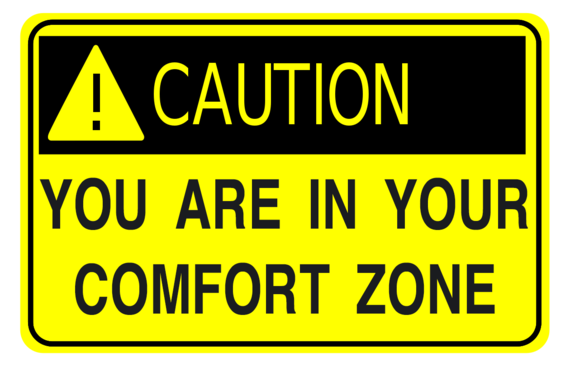Here's what's going to happen. You are going to read this post up to the point where you agree with me or you don't. Then, either you will find something else to do or, if I have your attention, you will write a comment or an email that espouses your world view.
This sounds great. Except it isn't. Because whether you agree with me or not, a huge percentage of you will not read past the point where your personal bias is confirmed. If my writing is inside your comfort zone, you will stop reading because we see eye to eye. If my writing is outside your comfort zone, you will stop reading because your time to engage with content is limited and you don't want to be uncomfortable while doing it. Sadly, staying in our ideological comfort zones has put us on a path to world destruction.
I write an article every Sunday about emerging trends and the impact they may have on media, entertainment and marketing. If you know my work, you know I don't write about politics or religion, just tech trends and what I think they mean. So comments from readers should be professional, should be on topic and should further the discourse with related criticism and opposing points of view. But that's not what's happening.
Have a look at a few recent posts: "The Video Selfie That Changed the World" or "Russian Email Hackers: Are You Next?" or "Facebook Is Killing Clickbait and The Results Will Surprise You." Then scroll down to the comments for an object lesson in the dangers of confirmation bias and the latest craze: spewing opinion as fact. If this were on some random site or a mainstream media site, I would not be surprised at all. But these posts are on a professional social network where (for obvious reasons) one would expect a certainly level of decorum.
Social Media-Empowered Echo Chambers
In the physical world, an echo chamber is a room where sound reflects off the walls. The early reflections are perceived as echoes and the later reflections are perceived as reverberation. In social discourse, an echo chamber is a place where like-minded people keep reinforcing each other's world views. MSNBC is a left-leaning echo chamber. Fox News is a right-leaning echo chamber. You can name hundreds of examples yourself.
But echo chambers do not challenge our world views, they do not expand our minds, and they do not promote Socratic debate. They just blanket us in the comfort of what we like to hear. Importantly, it doesn't matter how much moral high ground you believe your echo chamber represents -- an echo chamber is a closed-loop system that constantly feeds back on itself. Living in an echo chamber is not an evolutionarily stable strategy.
The Quick, but Painful, Death of Truth
Journalism has been on life support since the advent of social media, but this past year we have witnessed the quick, painful death of truth, and it may be gone forever. Put a comfortable lie in an echo chamber, and nobody will challenge it. It will reverberate until it is accepted as actually true. Then, the willfully ignorant will shout it as loudly as they can. It may be their truth, but that does not make it true.
Get Out of Your Comfort Zone
While we may not post really stupid stuff online or make outrageous comments to inspire others to do violence, we are all guilty of enjoying the pleasures of our respective comfort zones. We live in a world with extraordinary filters. They can easily be programmed to only send us notifications of things we want to hear. There are websites and news feeds across the entire spectrum of belief systems, and it is super easy to find your comfort zone and stay there. Don't.
The best way to get the world back on track is to do our best to understand each other. We need to relearn how to respect other points of view. We don't need to agree with them, but we need to read far enough down the page to understand what is really being said. We must listen when we converse. We must see when we look.
The alternative is a cacophony of isolated echo chambers, each believing that they have the moral high ground, and each sure that their respective deity is on their side. It's clearly where we are headed, and in practice, we may already be there. You may not think that your comfort zone could destroy the world, but your comfort zone is a place where you accept the things you cannot change. To make the world a better place, it's time for all of us to change the things we cannot accept.
About Shelly Palmer
Named one of LinkedIn's Top 10 Voices in Technology, Shelly Palmer is President & CEO of Palmer Advanced Media, a strategic advisory and business development practice focused at the nexus of technology, media and marketing with a special emphasis on data science and data-driven decision making. He is Fox 5 New York's on-air tech and digital media expert and a regular commentator on CNBC and CNN. Follow @shellypalmer or visit shellypalmer.com or subscribe to our daily email http://ow.ly/WsHcb

